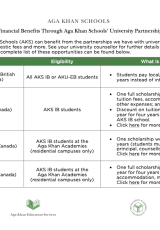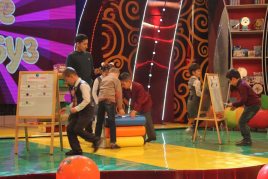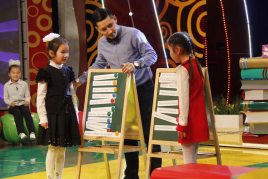Capturing the power of young minds to the love of reading
It is not hard to see the excitement amongst a number of Kyrgyz Republic communities at the tremendous progress their children have made in reading skills ever since the launch of the Aga Khan Academies’ (AKA) and the Aga Khan Foundation’s (AKF) Reading for Children (RFC) initiative. The initiative was launched in anticipation of the planned construction of the Aga Khan Academy in Bishkek.
The impact according to a report on the project has been “unique.” The effect on families has been demonstrated by the formation of home libraries and parents devoting more time to their children.
“Now, even when I am in a hurry to go to a party, if my child asks to me read, I take 15 or 20 minutes and comply. What has changed is that the whole family now reads together. We were told to read to our children to be closer to them,” states one participant.
“I am a mullah,” a father states, his voice full of enthusiasm. “I used to read a lot, but I never thought about reading to and with children." He pauses and then adds, “I thought that reading was something done by mothers or by children themselves,” he marvels, referring to a notion that the initiative may be challenging cultural norms.
What is Reading for Children?
The RFC initiative is a joint venture of the Aga Khan Academies and the Aga Khan Foundation’s Mountain Societies Development Support Programme on early childhood development. Its goal? To celebrate the power of words; to fire up children’s imaginations; to open up new horizons and new futures for them. Recognising that parents are the most important stakeholders in their children’s development, it aims to invite parents to more fully embrace parental responsibility for their youngsters. Building partnerships with local schools and communities, RFC advocates for the rights of children to access books and learn to read at an early age.
“The importance of learning to read and practicing and improving reading leads to the development of the joy of reading in the young. Through attractive, engaging and well-illustrated stories that are related to the children’s cultural context, these books fire their imaginations,” states Graham Ranger, AKA Academic Director.
As has been customary, outreach work within local communities has always heralded planned establishment of each of the Academies, the first three of which are currently in operation in Mombasa, Kenya; Hyderabad, India and Maputo, Mozambique. Each Aga Khan Academy has a two-fold mission: first, to provide an international standard of education to talented students selected on merit, regardless of their socio-economic background, ethnicity, religion or gender; and second, to help strengthen the profession of teaching in the surrounding region through outreach programming in the local community and in government schools. The fourth Aga Khan Academy will be established in Dhaka, Bangladesh, with 18 schools planned in total across 14 countries, including the Kyrgyz Republic.
Parent Resource Centres – redefining what is possible
Recognising that reading aloud to young children starting at an early age on a regular basis instills in them a love for books, thereby not only enriching their lives, but setting the stage for their future successes, RFC opened a number of parent resource centres in the area. RFC’s objective? To shake up reading and learning. To raise community awareness on the importance of reading and to foster a love for reading in children. Functioning as mini-libraries, these centres provide parents greater access to children’s storybooks. Equally importantly, the centres offer advice to parents and guardians on the best and most effective reading techniques to keep their young audiences captivated.
“We were trained on how to read to children,” one parent says, earnestly. “We were told to ask questions of the children. We were told that there are conceptual and factual questions, and it is important to be able to put them to the children.”
A watershed moment in literacy: taking reading to another level
Reading and learning have come to life in a very modern way here. Interactive reading lessons on national television and mobile apps are offered routinely to engage both parents and children in the activity.
This year, a show called Reading Together is in its fourth season on national television. A review of TV ratings in 2015 found that the show ranked number 6 in the broadcast channel’s Top 10 programing, reaching about 1.1 million viewers.With the show’s success, AKF in the Kyrgyz Republic also pioneered a mobile app, with technical partner Avisa. The goal of the app is to give children in remote communities access to Kyrgyz books on their Android mobile phones. Users can find all the titles published by RFC on the Reading Through Playing app. The app is available on the Google Play Store in three languages: Kyrgyz, Russian and English. In addition, the U.S. Agency for International Development provided support for developing a second app, titled, Fun Kitep 2 which translated means ‘reading is fun’. That app has already been downloaded approximately 5,000 - 10,000 times.
“I never thought when I started the RFC back in 2006 that it would go to another stage, and then another stage,” states Burulai Aitikulova, AKF Senior Education Advisor, radiating pride and determination for the Kyrgyz communities.
According to Burulai, parents have lauded the programmes and have said that RFC has played a vital role in their families’ unity and progress in reading and acquiring new knowledge. They have stated that they have reappraised their values and have improved communication with their children.
Burulai muses reverentially, “For me, hearing the parents reach that point of engagement is very satisfying. When you get to act on your new ideas and get support, it moves you forward. To be on a national TV channel with millions of viewers, several times a week, with the AKF logo that says, “This is supported by the Aga Khan Foundation,” I think that is something huge.”
By Perviz Walji
publications






